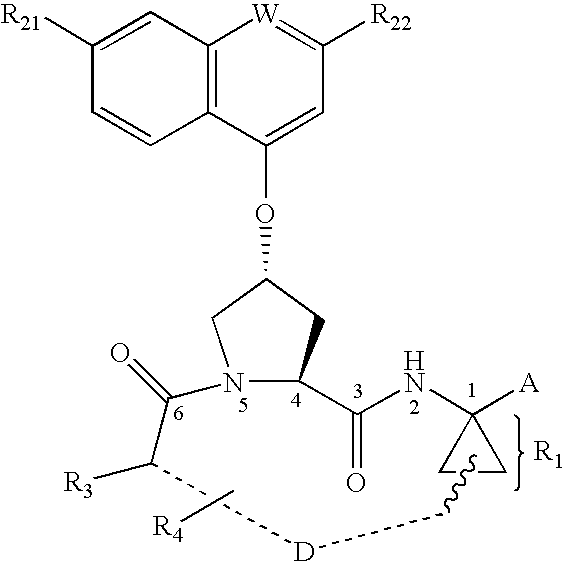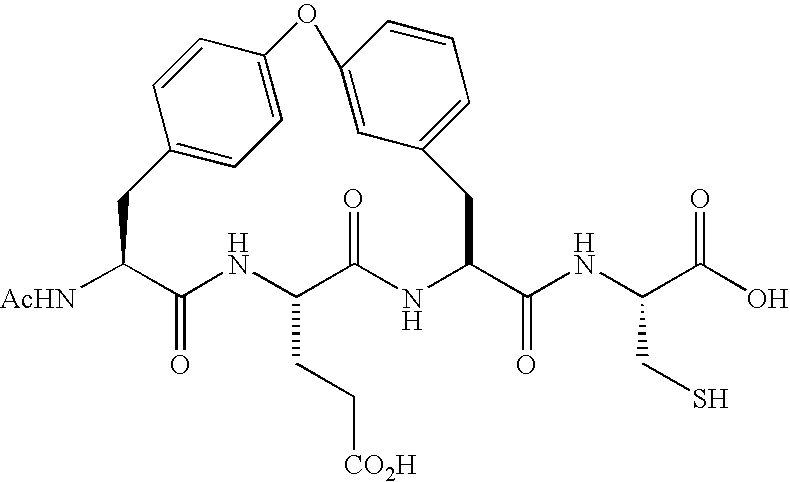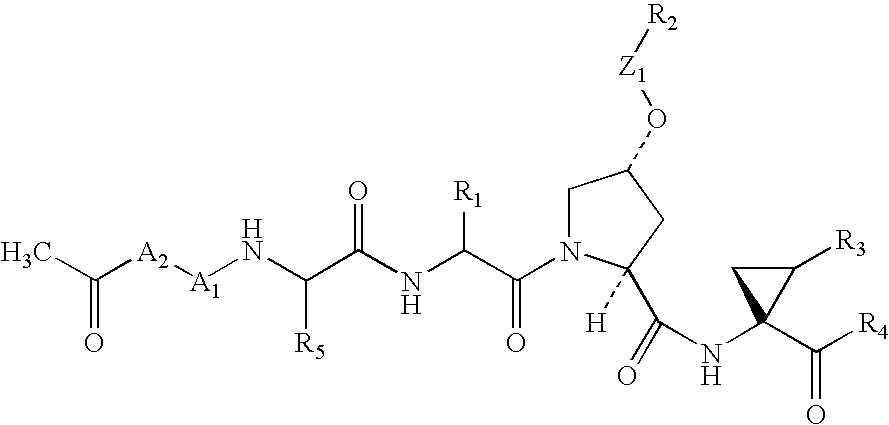Novel inhibitors of hepatitis C virus NS3 protease
a technology of hepatitis c virus and protease inhibitor, which is applied in the field of new hepatitis c virus protease inhibitors, can solve the problems of poor treatment effect of hcv infection, low sustained response rate of therapies, and frequent side effects
- Summary
- Abstract
- Description
- Claims
- Application Information
AI Technical Summary
Benefits of technology
Problems solved by technology
Method used
Image
Examples
example i
Preparation of Compound of Formula 4010
[0240]
Part I: Preparation of intermediate 4010.06
[0241] To a −20° C. solution of Amine 4010.01 (10 g, 72 mmol) prepared following the method of R. Zhang and J. S. Madalengoitia (J. Org. Chem. 1999, 64, 330) in DCM (200 mL) was added HATU (1.05 equiv, 28.8 g), Boc-L-Tert Leucine (Aldrich Chemical Co., Milwaukee, Wis., 1.1 equiv, 79.2 mmol, 18.3 g) and DIPEA (0.2 mol, 40 mL). Reaction was stirred for 24 h then was diluted with EtOAc and washed with NaHCO3. Organic layer was washed with citric acid then brine. Organic layer was dried over MgSO4, filtered and concentrated under vacuo. The residue 4010.03 (72 mmol) was dissolved in Acetone (1.2 L) at 0° C. Then, 5 equiv of Jones reagent (138 mL, 360 mmol, prepared by dissolving 91 g of Chromium trioxide in 70 mL of conc, H2SO4 and diluted to 300 mL) were added. After 45 min, no starting material was detected by TLC. Isopropanol (40 mL) was added and 500 mL of EtOAc. The green solution was filtered...
example ii
Preparation of Intermediate of Formula 4035.01, 4044.01, 4048.01, 4052.01, 4055.01, and 4076.01
[0249]
[0250] Isocyanates 4035.01, 4044.01, 4055.01, 4048.01 and 4076.01 were prepared according the procedure outlined in preparative example I by replacing in step1 the commercially available (L)-Valine N,O-Dimethylhydroxylamide with the corresponding tert-Leucine, cyclohexylglycine, spirocyclohexylglycine, cyclobutylglycine, homovaline, cyclopentylglycine respectively. N,O-Dimethylhydroxylamide were prepared from commercially N-Boc amino acids following the procedure outlined in step1 of preparative example of compound of formula 4032.
[0251] HCV inhibitors 4035, 4042, 4044, 4048, 4051, 4052, 4055, 4076, 4126, 4141 and 4147 described in Table I were prepared using intermediates 4005.01, 4035.01, 4048.01, 4052.01, 4055.01, and 4076.01 according to the general procedures described before.
example iii
Preparation of Intermediate of Formula 4011.01, 4079.01 and 4097.01
[0252]
[0253] Isocyanates 4011.01, 4079.01 and 4097.01 were prepared according the procedure outlined in preparative example I by replacing in step1 the Phenylmagnesium bromide by the commercially available Benzylmagnesium chloride and Phenethylmagnesium chloride with (L)-Valine N,O-Dimethylhydroxylamide or (L)-Homovaline N,O-Dimethylhydroxylamide or tert-Leucine N,O-Dimethylhydroxyl amide.
[0254] HCV inhibitors 4011, 4068, 4079 and 4097 described in Table I were prepared using intermediates 4011.01, 4079,01 and 4097.01 according to the general procedures described before.
PUM
| Property | Measurement | Unit |
|---|---|---|
| temperature | aaaaa | aaaaa |
| temperature | aaaaa | aaaaa |
| pH | aaaaa | aaaaa |
Abstract
Description
Claims
Application Information
 Login to View More
Login to View More - R&D
- Intellectual Property
- Life Sciences
- Materials
- Tech Scout
- Unparalleled Data Quality
- Higher Quality Content
- 60% Fewer Hallucinations
Browse by: Latest US Patents, China's latest patents, Technical Efficacy Thesaurus, Application Domain, Technology Topic, Popular Technical Reports.
© 2025 PatSnap. All rights reserved.Legal|Privacy policy|Modern Slavery Act Transparency Statement|Sitemap|About US| Contact US: help@patsnap.com



